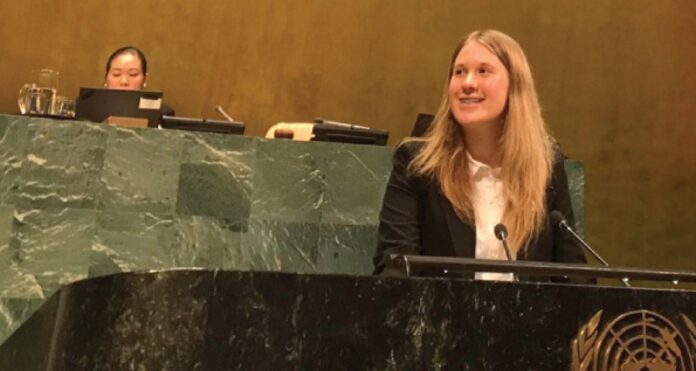Droughts, floods, natural disasters and constant media reports about new and previously unprecedented events in connection with the meteorological situation. We often say: “it’s good that winter was so warm, I hate when it snows in the city” or “I am happy that I don’t have to go on holidays abroad – for several years in Poland it has been hotter in summer than in Spanish resorts”. We do not notice the relationship between different events. Newspaper headlines talking about the lowest water level in the Vistula River for years, fires in the swampy areas of the Białowieża Forest or something that awakes our consciousness most – 400,000 premature deaths caused by the smog in Europe. Every tenth person from these statistics dies in Poland. And all this in one year only!
Are climate change and air, water or environmental pollution surrounding us really something far removed? Naturally, this is a rhetorical question. Climate change will affect the entire global population, including us Poles. We can feel the consequences sooner or later because of the region of the world in which we live, but scientists say it clearly: there are fewer than 10 years left to save our planet. Despite this, voices are still heard that we are not ready to change our lifestyle, abandon our habits, not to mention systemic changes that could help us fight the problem. Is this really the case?
Writing this text during the COVID-19 coronavirus pandemic, I have a completely different opinion. The pandemic made us stay at home, cancel journeys (including flights), meetings or simply change our plans for the near future. It was all possible. Can it also happen in connection with the fear that due to climate change we will no longer be able to function normally on our planet? Do we have to wait for the crisis to come in order to fight it? What did the time spent in isolation due to the coronavirus teach us?
Czy musimy czekać aż kryzys nadejdzie, aby zacząć go zwalczać? Czego nauczył nas czas spędzony w izolacji w związku z koronawirusem?
Young people did not have to wait for the global crisis to start thinking about what is important – how to save our (dying) planet. Already in the 70s of the last century, young people wanted to draw attention to the need to protect nature. The first protests, strikes, and Earth Day celebrations were aimed at showing decision-makers that the Earth is our common home and we must take care of it together. What has changed now? Despite the passage of years – not much. We still protest, strike, and celebrate Earth Day. But our planet is in a still worse condition, because the only thing that has changed is the date – from 1970 to 2020. Young people all over the world moved by Greta Thunberg’s lonely protest in front of the Swedish parliament decided to mobilize their forces and take care of what is most important. The Fridays for Future movement and its Polish equivalent – Youth Strike for Climate – motivated young people to act. Thousands of people around the world joined the protests in their cities, showing that politicians must address the problem of climate change.
Tysiące ludzi na całym świecie dołączały do protestów w swoich miejscowościach pokazując, że politycy muszą zająć się problemem zmian klimatu.
Participating in the world’s biggest climate strike to date, on 20 September 2019 in New York, I became even more convinced that it is young people who must have an impact on their future. We cannot disappoint future generations by depriving them of the opportunity to use the goods of our planet to the same extent that we have the honour of using now. The significance of the September 20 protests (also known as the “Thousand Cities March”) was extremely symbolic. It took place the day before the Youth Climate Summit, and three days before the Climate Summit of the UN Secretary General, which gathered the most important leaders of the world.
By participating in strikes around the world, young people have shown that they do not want to wait until the leaders make the right decisions – this must happen as soon as possible, because, as the UN Secretary-General says, “Climate change is moving faster than we are”. Moreover, young people want to be part of the climate talks and agreements. They don’t want to let their future be decided without them. By putting pressure on decision-makers, showing them the importance of civil society and the role of young people in making decisions, they want to be noticed and understood by politicians.
Wywierając nacisk na decydentów, wskazując im znaczenie społeczeństwa obywatelskiego i rolę młodzieży w podejmowaniu decyzji, chcą być dostrzeżeni i zrozumieni przez polityków.
After months of talks and looking for system solutions, Polish youth will have such a chance. The Youth Climate Council, which will start operating as early as the end of Septembers 2020, is an example of the fact that young people can participate in the most important discussions and influence the climate policy in our country. This is a huge step forward, it can even be considered historic. The appointment of an advisory body at the Ministry of Climate and Environment, consisting of young people between 13 and 26 years old, who will be able to present their ideas for solutions and changes, is hope for a better tomorrow. A summary of young people’s commitment in our country and appreciation of their efforts. The formation of the Youth Climate Council will awaken unprecedented energy – this energy that everyone who has ever participated in climate protests or environmental initiatives organized by young people felt. Inviting young people to the Ministry of Climate and Environment is opening the door to their brilliance and innovation. It is the first step in, I hope, reforming measures such as introducing a broad and appropriate climate education in Poland, supporting youth activity for the benefit of climate and taking young people into account when introducing regulations included in the European Green Deal.
The COVID-19 coronavirus pandemic has changed our attitude to life. We realized that we could not simply return to our ‘normality’ before the crisis, because it is this reality that was the problem. A reflection is needed on how to start living anew, in an ecological way, without having a negative impact on our planet. Only in this way can we save the Earth. Let’s start the new reality with a clean slate – now it depends on us what the future will look like and seeing the commitment of young people I am convinced that they will have a huge (positive) influence on it.
Katarzyna Smętek for ClimateNow!








